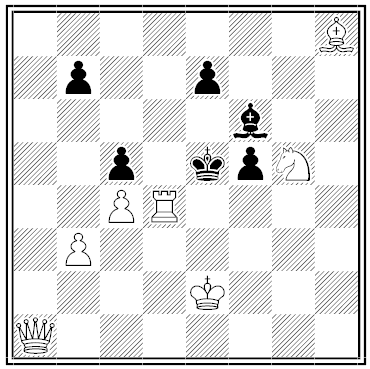Author: Greg Ross
So It Goes
The Man who thought about Proteids sat by the roadside, writing with an indelible pencil in a little notebook. And Spring, all in pink and white, came tripping by, and cried to him: ‘I will dance for you! Watch me dance!’ She danced very prettily, but the Man went on writing, and never looked at her once. So Spring, being young, burst into tears, and told her sister, Summer.
Summer said to herself: ‘Spring is very foolish to cry. Probably he does not like dancing. I will sing to him.’ She sang a beautiful sleepy song to him, but he never listened, being busy writing in his little notebook. Summer was indignant, and told her sister, Autumn.
Autumn said: ‘There are many good men who do not like dancing. I will give him some of my wine.’ So she went to the Man and offered him her purple wine, but he merely said, ‘I do not drink wine,’ and resumed his writing. Then Autumn was very angry indeed, and told her big brother, Winter, all that had passed.
Winter was an enormous fellow, with a dreadful roar and howl, and every time he moved, snowflakes came whirling from his flowing robes. ‘Show me the fellow,’ he bellowed, puffing out his cheeks. Then he saw the Man who thought about Proteids, still sitting by the roadside.
‘Do you know me?’ roared Winter, and the Man looked and his teeth chattered like dead men’s bones.
Then Winter seized him by the neck and whirled him round and round, and finally flung him over his left shoulder into space.
And the Man who thought about Proteids has not been seen since, but, the other day, a boy found the little note-book lying by the roadside.
— J.B. Priestley, Brief Diversions, 1922
Good Company
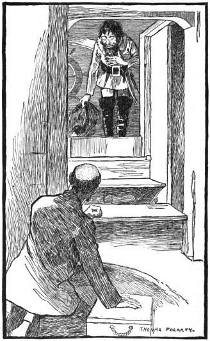
Sailing past the Azores on his solo circumnavigation of 1895-98, Joshua Slocum ate some bad plums and collapsed with cramps in his cabin. He awoke from a fever to find that he was not alone.
“I saw a tall man at the helm. His rigid hand, grasping the spokes of the wheel, held them as in a vise. One may imagine my astonishment. His rig was that of a foreign sailor, and the large red cap he wore was cockbilled over his left ear, and all was set off with shaggy black whiskers. He would have been taken for a pirate in any part of the world.”
“I have come to do you no harm,” the stranger told him. “I have sailed free, but was never worse than a contrabandista. I am one of Columbus’s crew. I am the pilot of the Pinta come to aid you. Lie quiet, señor captain, and I will guide your ship to-night. You have a calentura, but you will be all right to-morrow.”
Slocum drifted out of consciousness, but he awoke in the morning to find that the Spray had made 90 miles that night on a true course through a rough sea. As he lay on deck that day, the man revisited him in a dream. “You did well last night to take my advice,” he said, “and if you would, I should like to be with you often on the voyage, for the love of adventure alone.”
“I awoke much refreshed, and with the feeling that I had been in the presence of a friend and a seaman of vast experience,” Slocum wrote. “I gathered up my clothes, which by this time were dry, then, by inspiration, I threw overboard all the plums in the vessel.”
Wild Kingdom
Fourteen ladders stand in a row. At the foot of each ladder is a monkey; at the top is a banana. Festooning the ladders are an arbitrary number of ropes. Each rope connects a rung on one ladder to a rung on another, but no rung receives more than one rope.
At a signal all 14 monkeys begin climbing. If a monkey encounters a rope it climbs along it to the other end and then continues climbing upward. Show that every monkey gets a banana.
Backstory
When the dowager recluse Ida Wood died in March 1932, she drew more than 1,000 people into a court battle over her $877,000 estate. As a social belle of the Gilded Age, Ida Mayfield had lit up the city with memories of dances with the Prince of Wales and dinners with Abraham Lincoln among the prominent Mayfields of New Orleans. She had married wealthy publisher Benjamin Wood and, on his death, withdrew to New York’s Herald Square hotel, where she was found dead at age 93.
At the news of her death, 406 connections of the Mayfield family filed claims against her fortune, but judge James A. Foley managed to disappoint all of them. Ida, he found, was not a Mayfield at all — she was Ida Walsh, the daughter of English-Irish immigrants who had arrived in Massachusetts shortly before the Civil War. At 19 she had changed her name to Mayfield in order to impress people at her New York debut, and the ruse had succeeded beyond her wildest hopes.
“She was plainly actuated by her desire to suppress her humble origin and to assume an alleged social standing in the period before and after her marriage to Benjamin Wood,” Foley wrote. “It is the jest of fortune that having attained wealth and prominence, she abandoned her pretenses at the age of 60 and retired in strict seclusion.” Calling Wood “a very peculiar woman,” he divided her fortune among 10 cousins.
Black and White
That’s Logic
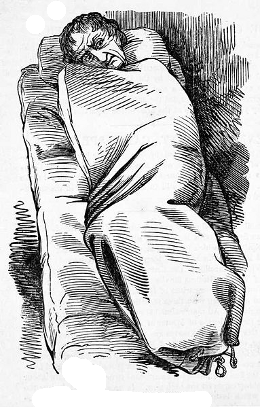
“If it is feared by a schizophrenic that nothing feared by a schizophrenic is the case, then there must be at least one other schizophrenic fear besides this one.”
— P.T. Geach, quoted in A.N. Prior, “On a Family of Paradoxes,” Notre Dame Journal of Formal Logic, 1961
Late News
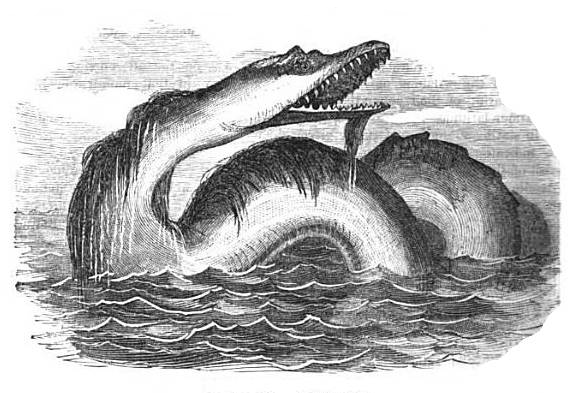
Beadle’s Monthly carried a startling feature in November 1866: two drawings of a “great sea-monster” witnessed by the author, Jesse H. Lord, during a visit to Green Harbor, Nova Scotia, in August 1855. Lord recalled that he had just arrived in town when he found the townspeople in a great commotion over “the snake.” Presently he saw a monster emerge from the sea, pursuing boats through a channel and into the harbor:
Near what might be the head, rose a hump, or crest, crowned with a waving mass of long pendulous hair like a mane, while behind, for forty or fifty feet, slowly moved, or rolled, the spirals of his immense snake-like body. The movement was in vertical curves, the contortions of the back alternately rising and falling from the head to the tail, leaving behind a wake, like that of a screw-steamer, on the glassy surface of the ocean. … In a moment he raised his head, from which the water poured in showers, and opening the horrid jaws he gave utterance to a noise resembling nothing so much as the hissing sound of steam from the escape-pipe of a boiler.
The beast withdrew, but Lord glimpsed it again beneath his rowboat the following morning:
The tide was ‘making,’ and the serpent lay head to the current, which was flowing into the harbor, keeping up an undulatory movement just sufficient to retain his position. The shell-like head was just abaft the stern of the boat and the immense mane flowed wavingly, either by the motion of the current or the convolutions of the body. … Hethcote moved silently to the stern and cut the rope that held the ‘kilick,’ and we drifted quietly with the tide into the harbor.
Lord was a journalist, not a short story writer, and Beadle’s presented his tale without a wink. But it seems most likely a simple hoax — why would a newsman withhold such a sensational story for 11 years? Unfortunately, we’ll never know the whole story: A few days after the article appeared, Lord shot himself on his wife’s grave.
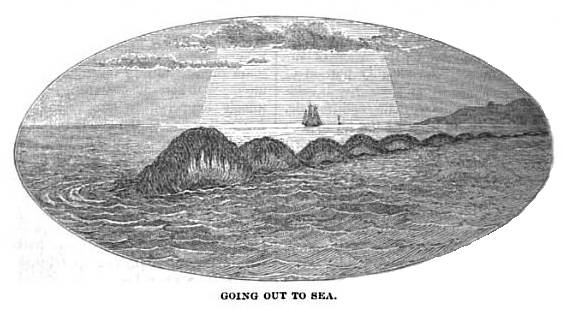
The Perils of Journalism
An accident, the consequences of which are expected to be fatal, took place at Cannes on Sunday last. A M. Despleschin, of Nice, had announced his intention of making an ascent in a balloon, and two gentlemen, M. Hardy, of Cannes, and M.A. de Sorr, a literary man from Paris, had made arrangements to accompany him. These two gentlemen had taken their seats in the car, M. Despleschin not having yet entered it, when some person in the crowd, anxious to see the balloon start, cried out ‘Let go.’ The man who held the ropes, thinking that the order had come from the aeronaut, obeyed, and the balloon rose rapidly into the clouds, and disappeared. M. Hardy and M. de Sorr are both entirely ignorant of the management of a balloon, and it is feared that they have been carried out to sea. Up to the 2d. no intelligence had been received of them.
— Times, May 9, 1854
In a Word
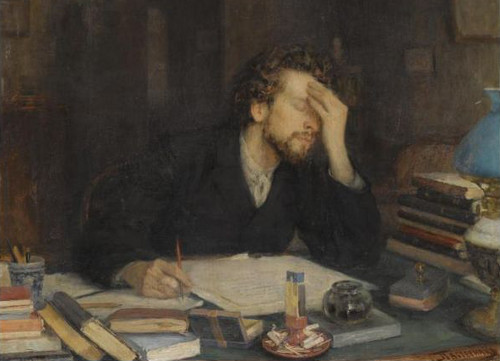
perpension
n. careful consideration


